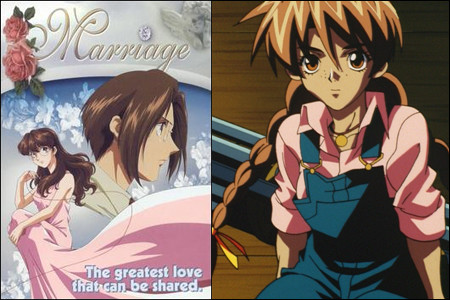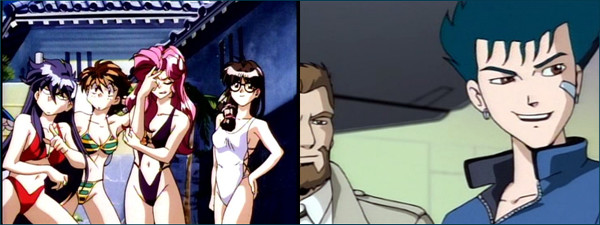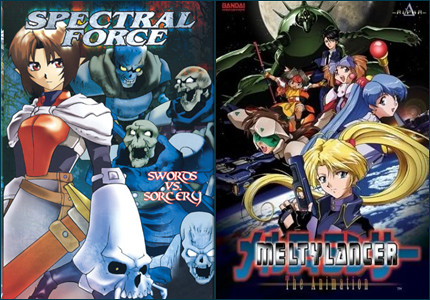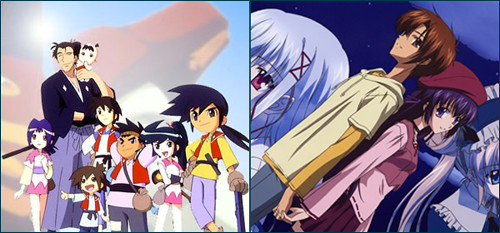The Mike Toole Show
Why Did This Come Out?
by Michael Toole,
You laughed. I laughed. We all laughed at the news of Media Blasters licensing Rio: Rainbow Gate, XEBEC's 2011 cheap, facile TV anime featuring the luck-tinged adventures of a comely pachinko mascot. This won't be our first encounter with the titular (ha!) Rio Rollins (named after Henry, I'm assuming)—she made an appearance in Tecmo's Dead or Alive Paradise PSP game. But the TV series, roundly dismissed by both critics and fans as lousy, seemed like an odd pickup for a company whose fortunes have been decidedly mixed in recent years. The thing is, the resulting forum thread did include several people vouching for Rio: Rainbow Gate, and vowing to buy the series when (if?) it makes its DVD release.
This got me thinking: is there a “floor” for DVD release in North America? Are there any titles out there that, for lack of a better explanation, fans just don't really want at all—guaranteed commercial failures? In the wake of the Rio news, my dear Discotek announced they'd landed the rights to release the TV anime adaptation of Monster Rancher—another Tecmo joint! in both dubbed and subtitled form. I could see the appeal of churning out inexpensive Monster Rancher dub box sets—we've been seeing companies like Shout Factory take this approach with a variety of shows (hell, they're even doing the 52-episode Jungle Book anime next month!)—but I was flummoxed at the idea of subtitled-only sets of Monster Farm, the Japanese original. But sure enough, a thin but undeniable vein of fans rejoiced at the news. Apparently, they've been waiting for years to see the adventures of Genki and his pals in the original language.
Still, I started making a list in my head of weird, half-forgotten anime—stuff for which commercial release just didn't make a whole lot of sense. Media Blasters is a grand champion in that category, so I guess their successful pursuit of Rio makes sense. As I started jotting ‘em down and the list exploded past fifty titles, I could only mumble “Ah, shit.” Let's talk about some of ‘em!

Hey, kids! Do you remember classics like Fight! Spirit of the Sword and Twin Signal? How about Marriage, Madonna, or Early Reins? Nope? Surely you watched and loved Detatoko Princess and Kirameki Project, right? …yeah, all of these are short OVAs from our pals at Media Blasters, and they've all gotten released on DVD, with expensive dubs included and everything. Going over stuff like this is especially interesting for me, since I've actually seen and reviewed almost all of them. In some ways, writing this column is a really handy way to keep track of exactly how much of my life I've wasted on this crap!
Of that above group, the two titles that seem particularly extraneous to me are Marriage and Early Reins. Surprise—they're both based on video games. Video games that never came out here, so they lack the cachet of even crap like Samurai Shodown and Art of Fighting. Marriage is based on a dating sim—a “galge” game for Sega Saturn and PlayStation all about choosing your most suitable marriage partner from a group of engaging young ladies. From that angle, I suppose the idea is modestly interesting—the only big dating sim hit we've had on these shores is Mass Effect 2—but the execution is painfully dull, a trio of ugly, by-the-numbers vignettes about awkward dates and workplace encounters. The Japanese version has a crumb of appeal thanks to its function as a vehicle for popular seiyuu of the day, like Aya Hisakawa and Hiromi Tsuru, but the dubbed version obfuscates even that. The weirdest thing about the origins of Marriage, however, is the fact that it's a sequel to an OVA we never got here—an early dating sim spinoff called Graduation. Bizarrely, TOKYOPOP released the original Graduation PC game on CD-ROM, where it entirely failed to make an impression. (What do you suppose the most popular early/mid 1990s Japanese PC game to get released in North America is, anyway? Thexder, or Cobra Mission?)

Early Reins is even more tragically weird, as it's based on a video game that never got released. Think about that for a second—in the world of commercial entertainment, is there anything sadder than a tie-in product for a larger project that never even gets finished? The closest analogue that comes to my mind on these shores is the video game Spy Hunter: Nowhere to Run, starring Dwayne Johnson. Johnson was supposed to star in a movie released at the same time, but the movie went to development hell, forcing the half-completed game to soldier on. Early Reins’ situation is actually kinda similar—the animation was started before the game was completed, driven by the idea that both the finished PlayStation game and animation could be packaged for sale in North America if it failed to succeed in Japan. But developer bankruptcy and the subsequent fire sale of the entire brand to Toho meant that the game would sink, while the nearly-finished anime made it to market.
Early Reins itself—a boring yarn about a quintet of cute girls who try to uphold frontier justice in the old west town of Sunshine Hill—barely rates discussion. It's never really awful—the workmanlike presence of Oriental Light and Magic prevent that—but it's boring fare driven by a largely anonymous cast and crew. Media Blasters pooped this out without much fanfare in 2004; I like to think that they discovered the rights to it in a box of cereal, or something.
But hey, there's plenty more where that came from! Come on guys, don't you want to talk about fan favorites like Seraphim Call, and Tattoon Master, and Samurai: Hunt for the Sword? That last one is probably the least interesting anime to include the word “samurai” in the title, which is a hell of a trick since that group also has “standouts” like The Samurai and Samurai Gun. Originally titled Kaitouranma (“Blade of Chaos,” maybe?) ,it's a relic of an era where every story of feudal Japan had to include “samurai” in the title, which is also why Sony called another series “Samurai X” before they figured out that Rurouni Kenshin was a perfectly good English title. Media Blasters also turned up eminently forgettable fare like 10 Tokyo Warriors and Fortune Quest. Did anyone see these? Because I sure didn't!
I'll touch on two more weird Media Blasters releases. The first one is Sailor Victory. Its release on our shores seems like a fairly safe bet—it's a gentle magical girl parody with imagery baldly swiped from Sailor Moon, with more than a hint of cheesy fanservice. But just like the earlier Marriage, it's a weird spinoff of the popular-in-Japan Graduation, featuring the heroines from that business recast as magical girls. Since there's no way to watch Graduation, I guess that people who saw Marriage and really, really wondered what those ladies would be like as Sailor Moon clones with a giant robot can check out Sailor Victory!

Last but definitely not least from the immense wagon train of inscrutable Media Blasters releases is Space Travelers: the Animation. See, here's the deal: back in 2000, film director Katsuyuki Motohiro turned out Space Travelers, an energetic crime/caper comedy starring a neat ensemble led by Takeshi Kaneshiro and Eri Fukatsu. I saw the film several years ago (there was a Hong Kong DVD with subtitles), and it's actually quite enjoyable—I'd compare it to the Bill Murray vehicle Quick Change. But its big central story element is that our irascible, inept robbers all take their goofy code names (Dragon Attack! Hayabusa Jetter!) from Space Travelers, the main character's favorite cartoon. As the movie progresses, snatches of the original cartoon show up, revealing that the goofy robbers actually match their cartoon counterparts’ nutty personalities pretty well. But it wasn't enough for Motohiro to just create a few minutes of animation—he churned out a complete script and storyboard, turned it over to Media Vision, and bam! We got a 45-minute OVA. As my colleague Todd Ciolek notes in his comprehensive writeup, it's not great, but it's surprisingly not bad at all. It's just incredibly weird that we got this on DVD, but not its undeniably fun , accessible film progenitor. If you've ever seen the movie Matinee starring John Goodman, this product kind of resembles the surprisingly extensive set of footage they shot for the in-movie movie Mant!. It's just that kind of affair.
You know how Early Reins was based on a video game that never got released? It's not the only one. In fact, it's not the only one that got released in North America. Another title that shares that dubious honor is the remarkable Spectral Force. Spectral Force was conceived as an ambitious “media mix” deal, with video game courtesy of Idea Factory, manga by Shingo Kuwana published by Studio Ironcat, and anime adaptation from ADV Films. The press materials that came out never made it clear which installment of Spectral Force was supposed to arrive—there were a few of ‘em in Japan—but it never made it out on these shores. The manga didn't show up, either, but I guess that might've involved the late Ironcat's frequent financial/operational troubles. ADV dutifully completed and released the anime, years after the fact (2003, versus the initial announcement in 2000), and it's pretty awesomely terrible. ADV's own Matt Greenfield has quietly speculated, in conversation with me at a couple of conventions, that he suspects the anime is really just cutscenes from the unfinished game, fleshed out just enough to create a separate, sellable OVA. If you watch it, you might find yourself agreeing with his theory.

Bandai Entertainment, in its sadly concluded history, had a few titles with inscrutable origins and release patterns. I've talked about Cyber Formula GPX, which does have its defenders, but recently learned that it was, as I suspected, a contractual deal—one of the show's main staff, who has clout at Sunrise, asked for it to be released in English before another one of his shows. This is per an anonymous source, but it sounds to me like it might involve Mitsuo Fukuda, who directed both Cyber Formula and Gundam SEED. It seems hilarious to me that something like Gundam SEED was contractually tied to Cyber Formula, but hey—the latter got released, right? So maybe it's true. I have a couple of favorite weird licenses from Bandai, and one of them is Melty Lancer.
Melty Lancer is—surprise—based on a video game, and it sucks! It's awful, amateurish, cookie-cutter crap about cute girls and their starships, which is particularly surprising when you note that it was directed by Takeshi Mori, who's a bit better known for fare like Otaku no Video. The 6-part OVA looks alright, thanks to work from then-red-hot Gonzo, but it's a slapdash affair. My favorite Melty Lancer detail, however, has nothing to do with the show's production, but is about the fact that it was licensed by ADV Films in 2000. Years later, it was quietly released—by Bandai Entertainment. This sowed confusion, until ADV rep David Williams explained that they'd optioned the title but decided to pass on it. I love weird, backroom details like this—the business of anime is fascinating, isn't it? A slightly similar example that comes to mind would be Tactics—this supernatural action series from Studio DEEN was acquired by ADV back in the mid-2000s, but it ended up getting released by Manga Entertainment, complete with dubs and subtitles from ADV. Once again, this confused fans, until ADV simply explained that their crowded release schedule meant that simply passed on Tactics and sold their adaptation on for Manga's release.
Another curious title that Bandai took their sweet time releasing is Clockwork Fighters: Hiwou's War. I couldn't make it too far into this series, because it's jarringly ugly and strange-looking, and not really in a good way. The thing about it, though, is that this series is actually courtesy of BONES, the Cowboy Bebop alumni who turned out big hits like Darker than Black, Star Driver, Wolf's Rain, and Rahxephon. The show's big weakness is also probably it's biggest asset—creator and scriptwriter Shou Aikawa, a mercurial writer who gave the original Fullmetal Alchemist anime such fierce and superb political intelligence. His oddball political commentary is definitely present in Clockwork Fighters, but it's more or less his attempt at making a kids show, a period piece about robots in 19th-century Japan. Bandai Entertainment announced its acquisition early in the 2000s, but didn't finish the series until 2008. You can kinda see why they left it on the backburner.

The last example I'll toss in from Bandai is a zany mix-up! See, Bandai Visual USA, the “WE UNDERSTAND ANIME FAN WANTS!!” guys, released a bunch of titles, some of which weren't properly completed, or even issued at all. One of them was called sola, a romance involving cute girls. When Bandai Visual USA was dissolved and incorporated into Bandai Entertainment, the company slated a cheap-o Anime Legends set of the entire series, just to get the damn product to market. That came out in 2009. Less than a year later, Sentai Filmworks announced their release of sola, which was to come out at a slightly higher price point. A whole lot of people were confused at this, since Bandai's sola was still available everywhere. Eventually, both companies admitted, in a joint statement, that Sentai had gotten the rights to sola more or less by accident. The statement seems to indicate that Sentai could have gone ahead and released their own version—but they were good sports and scrapped the release. It wouldn't have made sense, anyhow, with Bandai's version still so readily available. I've long told the story of how Machine Robo was licensed by accident by Central Park Media, so it's comforting to know that it's not the only one!
Speaking of Central Park Media, what did they release that beggars belief? Not too much—they were a shrewd company, who banked on even their most dubious releases having some kind of action or sex appeal. Fare like Big Wars and Garaga didn't seem particularly exciting, but I guess someone was buying ‘em. I look at a release like Legend of Himiko and can only imagine the senior staff at CPM looking at each other and going “well, everyone else is still doing TV shows, so I guess we gotta get a couple too.” That said, I don't think I've ever met anyone who actually likes Battle Skipper or Mask of Zeguy or Wild Cardz. I've seen all three, and at this point, I can barely picture them.
What does that leave us with? Manga Entertainment released Amon Saga, which a lot of older anime fans immediately mistook for the Amon: Apocalypse of Devilman OVA. They also barfed up Psychic Wars, which shouldn't be confused with either Vampire Wars, or with Psychic Force, a terrible anime from Image Entertainment based on a terrible fighting game. Most of Viz's releases made a certain amount of sense—even the tough sells like Ogre Slayer had manga tie-ins—but I'm pretty sure their aborted Corrector Yui release only happened because a dub, for the international market, had already been produced anyway. Pioneer/Geneon gave us Burn Up Scramble, the least watchable portion of the Burn Up saga (and that's saying something!), as well as Hyper Doll. Hyper Doll, a boring fanservice comedy, did eventually get a manga tie-in—but I only really remember it for the weird laserdisc covers.

There's plenty of other titles from smaller publishers that I've looked at and just thought “I don't get it—why that?!” There's Geisters from Anime Crash, and Joe vs. Joe from Anime Who, and Miami Guns from AN Entertainment. This stuff didn't exactly set the world on fire. But in some ways, I'm thankful for the sense of adventure (or recklessness, maybe) from the American anime business. Without it, I have no doubt that we'd have never gotten English versions of great stuff like Armored Trooper VOTOMS, Prefectural Earth Defense Force, and Cat Soup. If we need to slog through numbingly bland fare like Takegami, Z-Mind, and Eden's Bowy to get to the real hidden gems, so be it!
Alright, now that I've got that out of my system, I want you people to fess up. I want you to look over every weird, misplaced title on this list, and if it's something you really liked, you have to admit it in the forum thread. Don't worry, I like some weird crap, too. Like Hakugei. I have no idea why ADV Films saw fit to release it, and it's an obviously flawed little series, but I enjoy its Dezaki-ness. So which of these titles is your ? Just think of it as a thought experiment. Using this data, we'll go on a magical quest to discover anime that absolutely nobody likes!
discuss this in the forum (111 posts) |